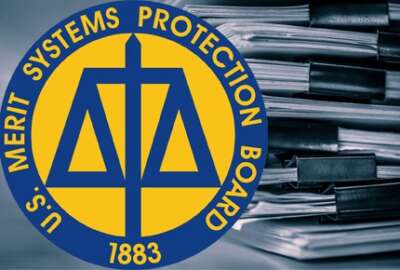UPDATED
After years of historic absences, Biden’s MSPB nominees face their first test
Senators on both sides of the aisle agreed the president's nominees for the Merit Systems Protection Board are experienced, and they expressed a desire to restore a...
Federal employees, whistleblowers and advocacy groups have anxiously awaited the restoration of a quorum at the Merit Systems Protection Board, viewing President Biden’s three nominees as perhaps their best shot in achieving a goal that’s been elusive for nearly five years.
The nominees — Cathy Harris, Raymond Limon and Tristan Leavitt — faced their first test Wednesday morning in front of the Senate Homeland Security and Governmental Affairs Committee.
The committee’s top two leaders praised the nominees for their experience, and they lamented the board’s historic absences.
The board hasn’t had a quorum for more than four-and-a-half years, and it hasn’t had any members at all since March 2019.
But the nominees still face a long and arduous Senate confirmation process — one that’s failed previous board nominees and prolonged historic absences at the agency in the past.
“Prolonged vacancies on the board slow the administration of justice, and, for years, vacancies on the MSPB have prevented federal employees from obtaining relief from prohibited personnel practices,” Senate committee Chairman Gary Peters (D-Mich.) said Wednesday morning at the nominees’ confirmation hearing. “If the three nominees before us today are confirmed, the MSPB will have a quorum for the first time in nearly five years, a crucial step towards preserving the rights of federal employees and protecting whistleblowers from retaliation.”
Cathy Harris is a long-time federal employment attorney. Raymond Limon is the chief human capital officer for the Interior Department with federal HR experience at the State Department and Office of Personnel Management.
And Tristan Leavitt is general counsel for the MSPB, where he’s also served as the agency’s acting chief executive for the last several years while the board hasn’t had any members. In introducing Leavitt to the committee, Sen. Chuck Grassley (R-Iowa) called his former staffer the “perfect choice” for the job.
Wednesday’s nomination hearing, of course, is just the first step.
The same Senate committee met more than three years ago to consider MSPB nominees from former President Trump. One nominee eventually took his name out of the running, and Trump nominated another candidate the following year.
But none of Trump’s nominees made it through the Senate confirmation process, frustrating whistleblower advocates and federal employee groups.
The MSPB is one of several agencies designed to uphold and safeguard merit system principles inside the federal workforce. Without a fully functioning board, federal employees lose sight of the institutions that are supposed to protect them, Limon, the president’s pick for MSPB vice chairman, said.
“Yes, there are wonderful employees currently working very hard at MSPB,” he said. “Not having the quorum and not having that leadership, people are going to think we’re not at full strength. And truth be told, it’s not at full strength.”
Nominees describe possible strategies for reducing MSPB backlog
A backlog of pending cases has built since January 2017, when the MSPB lost its quorum. There are currently 3,421 petitions for review awaiting action from confirmed members, according to the board’s most recent data.
To address the backlog, Harris said she would first meet with MSPB staff who have their own ideas and potential strategies for tackling the workload. Then she and the board members would agree to a “triage strategy.”
The board may, for example, tackle the oldest cases first. They could prioritize whistleblower retaliation cases, or cases involving terminations or stay requests that the Office of Special Counsel couldn’t bring to the board, Harris said.
She also recommended the MSPB resume the practice of issuing short form decisions.
“The short form decision is similar to when a federal court, the appeals court, affirms, denies or remands the underlying decision without a lengthy explanation of the reasons for the decision,” Harris said. “There are many cases for which that would be perfectly appropriate, for example, if they’re clearly untimely or there’s a lack of jurisdiction, or the administrative judge’s opinion is really well-reasoned or well-stated and there’s nothing more to add.”
Both Leavitt and Limon agreed with the approaches Harris described. Historically, the board members haven’t spent much time discussing the cases amongst themselves, Leavitt added. He also sees an opportunity for the nominees to embrace that practice and possibly save time through the course of their discussions.
“Fundamentally in the past the board has decided about 1,000 cases a year, but that’s all there were to decide,” Leavitt said. “It’s really not entirely clear what a sustainable pace will be. But no matter what it is, just putting in the work and working our hardest, putting in the time, will really make a difference.”
Sen. Rob Portman (R-Ohio), the committee’s ranking member, described the MSPB as a “really important” agency.
“We obviously need a quorum, and we need to move forward with these cases that have been languishing for years,” he said.
In a letter to Senate committee leadership, the Make It Safe Coalition Steering Committee, a group that includes the Government Accountability Project and Project on Government Oversight, among others, encouraged members to expeditiously advance Biden’s nominees.
“The destructive impact on the merit system is unprecedented and the board, in its own words, ‘faces its most dire crisis since it was established by the Civil Reform Act of 1978,'” the coalition wrote. “Concerns are inherent for any nominee, and the advice and consent process requires scrutiny and policy commitments. However, each of these MSPB nominees has a track record of responsible, effective public service from diverse public and private perspectives.”
How quickly that might happen, if at all, is still an open question.
At least two committee members zeroed in on past social media posts from Harris, the president’s pick to serve as MSPB chairman. Portman and Sen. Josh Hawley (R-Mo.) flagged a few of her tweets and retweets, which they described as hostile toward Republicans.
The posts covered Trump’s Supreme Court nominees and the previous administration’s decision to ban certain kinds of diversity and inclusion training, topics that have doomed or delayed nominees in the Senate confirmation process in the past.
“In light of those partisan statements and the approach that you have taken in the past, I’d like to know how can people in the federal system feel comfortable that they’re going to be fairly heard and fairly treated?” Portman said.
As a trained adjudicator, Harris said puts her personal opinions aside and focuses on the law at hand.
“I’ve represented Democrats, Republicans and people who I have no idea what their party is. I’ve represented federal agencies under, I think, every administration for the past 20 years,” she said. “[With] my personal opinions, I’m very well-practiced at putting them aside and advocating for my clients in the most zealous manner that I can for their benefit. If you asked my clients, the MSPB administrative judges before whom I’m practiced, federal court judges and my opposing counsel, they would tell you I’m fair, objective and I do my best.”
Harris said she regretted the tweets and retweets and vowed to put her personal opinions aside on the job.
“I’ve learned a valuable lesson about retweeting others who have used words that I wouldn’t have personally chosen, and I think I’m never going to retweet anyone ever again,” she said. “I certainly want to do better going forward, and I will do better going forward. I probably will never use Twitter again, anyway.”
Copyright © 2025 Federal News Network. All rights reserved. This website is not intended for users located within the European Economic Area.
Nicole Ogrysko is a reporter for Federal News Network focusing on the federal workforce and federal pay and benefits.
Follow @nogryskoWFED





